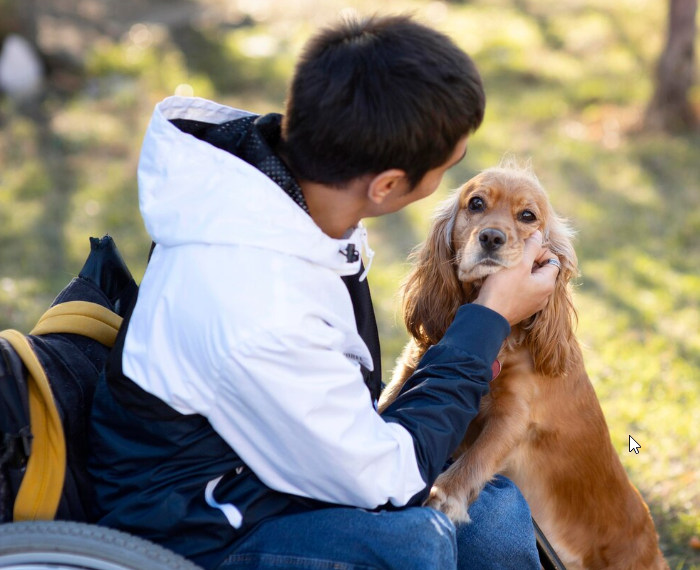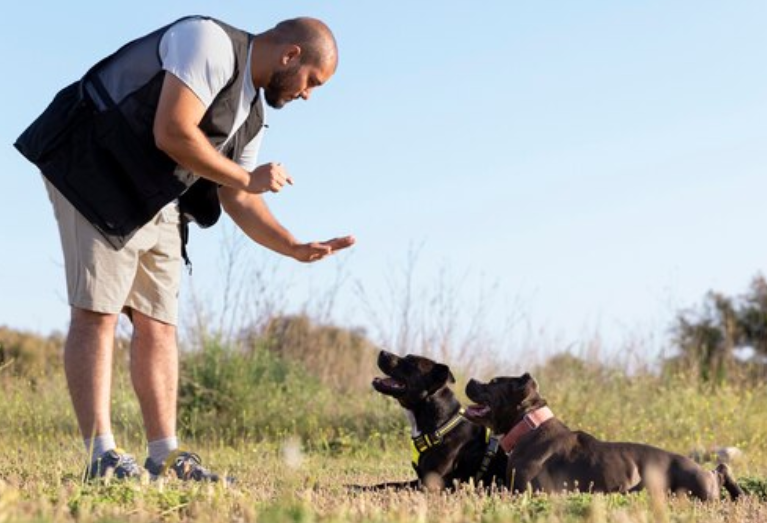
Many of the decisions we make in our lives are related to money... We should never lose our perspective or neglect our beliefs; however, we should also be practical. Reality requires us to be…
Whether born with a disability or having to deal with it at some point in their lives, many people have to deal with all the challenges it brings. Service animals have proved extremely beneficial for numerous individuals worldwide, helping them enjoy life again, regain their confidence, and manage difficult situations!
Having a service dog, or better said- becoming a part of a handler-service dog team is not a simple process, but a transformative journey! It offers a totally new positive experience that changes your life!
Why don’t more people have service dogs then? One of the main reasons for that is money. Getting a well-trained service dog can cost you about $20,000-$30,000 or more.
Today we will discuss the expenses that accompany the process of receiving a service dog, the options for grants/fundraising that are available, and the alternatives that may offer a better solution for people in need of an assistance/service dog.

Why Is Getting a Service Dog So Expensive?
Some of you may think: “This is only a dog, why should I spend thousands of dollars for a dog?!?”
Service/assistance animals are not just dogs. They undergo individual training that has to meet specific standards- minimum work of 120 training hours and three mandatory components-basic obedience training, specific service dog training, and public manners.
You can add to this the proper care for the dog, including food supplies, training gear, regular veterinarian visits for checkups, vaccinations, parasite control...etc.
Service animals are a medical necessity, whose support is crucial for the well-being of their owner.
We should also add that the organizations that raise and train service animals, usually invest a lot of time in the process-about 1–2 years and start from the very beginning. Many of them breed certain types/breeds of dogs themselves and engage in teaching the dog everything- from the very basics, i.e. potty training and addressing issues common in puppies, to basic obedience commands, socialization, training them in specific tasks and making sure they behave well around other animals and people.
Often, service owners realize they are the ones, who have to catch up on the skills needed to be a part of a service dog team. The main reason is that once a person and a service dog are paired, the dog has already undergone extensive training. It is the owner who also needs to learn to function as a part of that team and handle the dog properly.
Are All Types of Support Animals So Expensive?
No, Emotional Support Animals and Therapy Animals are not expensive. These two types of support animals are considered companion animals, as their role is to provide comfort and companionship only without performing specific tasks. In other words, they do not require special training, therefore they are not considered medical equipment.
It is important that you, as a service dog handler, are able to explain what tasks your service dog has been trained to perform to prove they are not a pet, but medical equipment.
What Financial Options Do You Have?
Fundraising
Many organizations support applicants for service dogs by covering part of the amount and/or offering options for fundraising. These options could be implemented through specific campaigns that are part of the organization’s network or through external resources.
In the second case, this may include utilizing social media channels to raise awareness of the cause and reach a wide range of people; organizing events within the community; and reaching out to relatives and friends for support, who can, in turn, make other people aware of the campaign too.
Grants
There are organizations that offer grants to individuals who are looking for a service dog. We will list below several organizations that may be able to help you in your endeavor!
Flexible Spending Accounts (FSA)
As employer-sponsored benefit plans, FSAs, allow you to set aside pre-tax amounts to cover eligible medical expenses. These accounts are governed by the Internal Revenue Service (IRS).
If you opt for FSA funds to purchase a service dog, there are several important things to keep in mind:
The cost of a service dog may be considered an eligible medical expense if you have a qualifying medical condition or disability. The IRS defines eligible medical expenses in Publication 502, and service animals can be considered a deductible medical expense if they are trained to assist with a specific medical condition.
To qualify for reimbursement under an FSA, the expense, in this case, the use of a service dog should be prescribed by a licensed healthcare provider. In this case, you need a medical letter issued by a licensed health professional as proof of your need for animal assistance. Medical letters do not disclose any personal information related to the individual’s disability, but generally state that the healthcare provider is aware of their condition and a service dog would benefit them as part of the treatment.
Keep thorough documentation of the expenses related to obtaining and caring for the service dog. This may include the cost of purchasing the dog, training expenses, and ongoing care costs. Save receipts, invoices, and any relevant medical documentation.
To use your FSA funds for any service dog-related expenses, you may need to submit a claim to your FSA administrator. This typically involves providing documentation of the expense and may require completing a reimbursement form. Check with your FSA administrator for specific procedures.
Last, but not least, FSA plans can vary, and it's essential to review the details of your specific plan. Some employers offer a grace period or a carryover option to use unused FSA funds from the previous year, but others may have a use-it-or-lose-it policy.
Personal Loans
In contrast to the previous options, personal loans need to be repaid, which is probably the main difference between them and the other types of grants
Make sure that you are ready to cover the costs, accompanying the raising and training of a service dog. Always keep in mind that a service dog is a long-term investment.
What Organizations Offer Grants for Service Dogs?
Assistance Dog United Campaign
According to the information on the organization’s website, they are a health and human welfare organization based in California. The ADUC is engaged in raising funds for service dog placements, as well as grants that aim for industry research and development. The organization also offers specific program development projects.
Canine Companions is an organization, that provides (for free) two types of support animals:
- service dogs to children, adults, and veterans with disabilities;
- facility dogs to workers in healthcare, educational settings, and criminal justice.
The Seeing Eye
The organization breeds and raises puppies to become Seeing Eye dogs who are specifically trained to assist blind people. The organization also helps individuals who need an assistance dog learn how to properly handle and take care of their dog. Doing and supporting research on dog health and development is also among the activities the organization is engaged in.
The organization trains and places assistance dogs to support individuals with various disabilities. Their programs encompass providing customized assistance dogs to children, adolescents, and adults with physical, neurological, psychiatric, or emotional disabilities; as well as providing customized service dogs to veterans, service members, and their dependents with physical, neurological, psychiatric, or emotional disabilities.
Assistance Dogs International (ADI)
ADI is an internationally recognized coalition of non-profit programs that train and place Assistance Dogs. ADI has accredited members worldwide. Their members on a local level can be found on the following page: MEMBER SEARCH
Duo Dogs
Duo Dogs is a non-profit organization, accredited by ADI, that provides assistance dogs to support people who deal with physical challenges; facility dogs, who support individuals in need of emotional comfort and companionship; and therapy dogs that help bring a sense of serenity and improve the overall well-being of patients and students in school classrooms and libraries.
The organization offers breeding programs, puppy socialization and training, and matching clients and dogs.
Guide Dogs for the Blind
The organization helps “prepare highly qualified guide dogs and K9 Buddy dogs, provide guide dog readiness skills, and offer youth programs to empower individuals who are blind or visually impaired”.
Their services are provided free of charge and include personalized training, ongoing support, and financial support for veterinary care if needed.

Alternative Options to Have a Trained Service Dog
Based on the laws in the country, where you reside, you may be legally allowed to train your pet dog as a service/assistance animal, e.g. in the US, the UK, the Netherlands, several Canadian provinces, depending on regulations on a provincial level, etc.
Training your own pet dog has many benefits along with its affordability! It helps you deepen the bond with your paw friend and understand them better. Being attuned and emotionally connected is essential in service dog training, which relies on mutual trust and unconditional love.
Whether you will rely on online learning materials which are available for free or structured training programs and tutor support, depends on you.
We would advise you to become aware of your local laws and explore the opportunity to train your paw partner as your assistance animal. Get familiar with all the pros and cons of this opportunity, and make sure you will be committed, determined, patient, and confident in yourself and your paw partner, should you decide to go that way.
With perseverance and determination, we can achieve anything!











